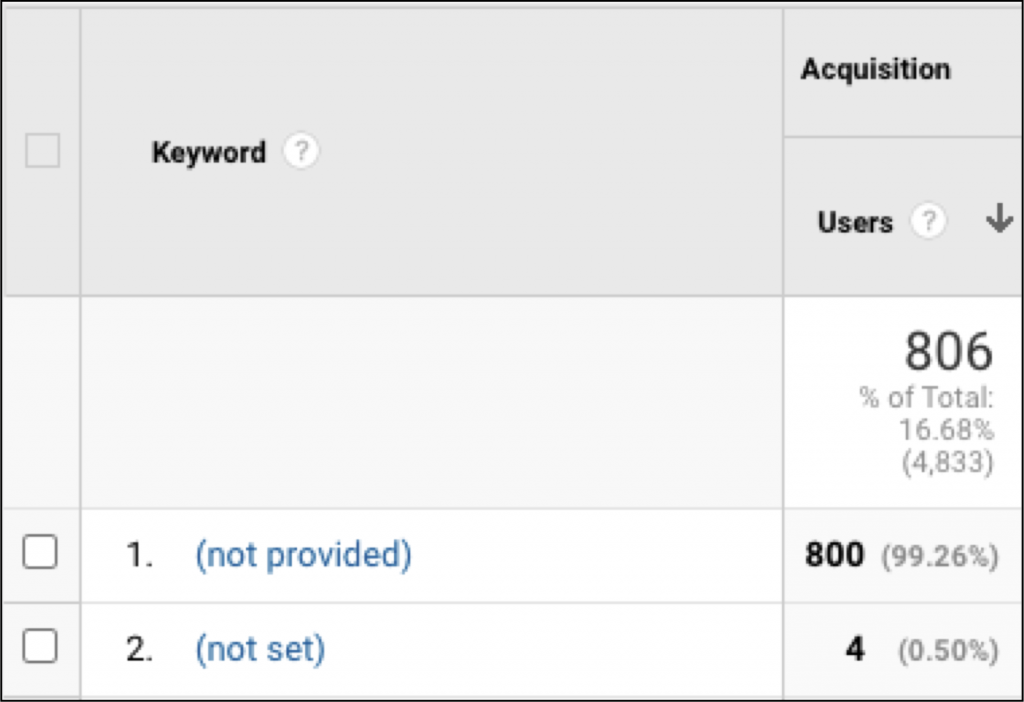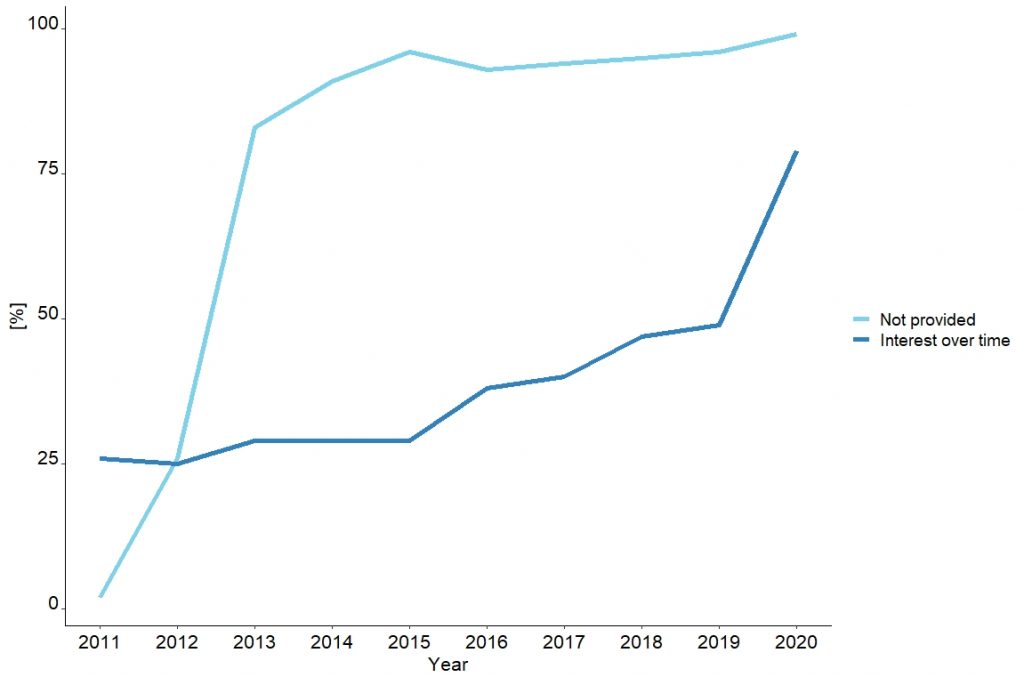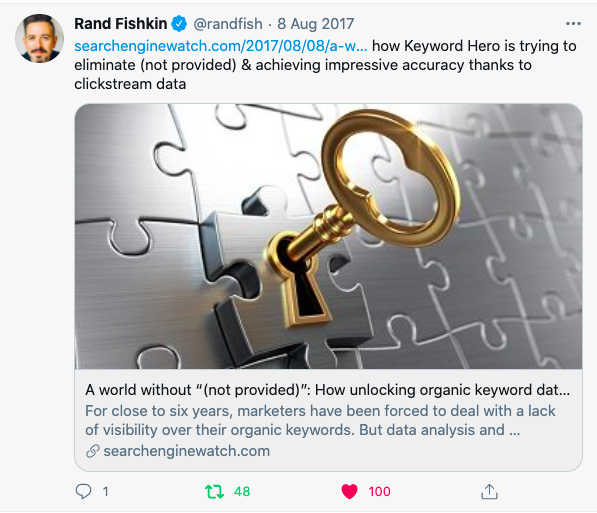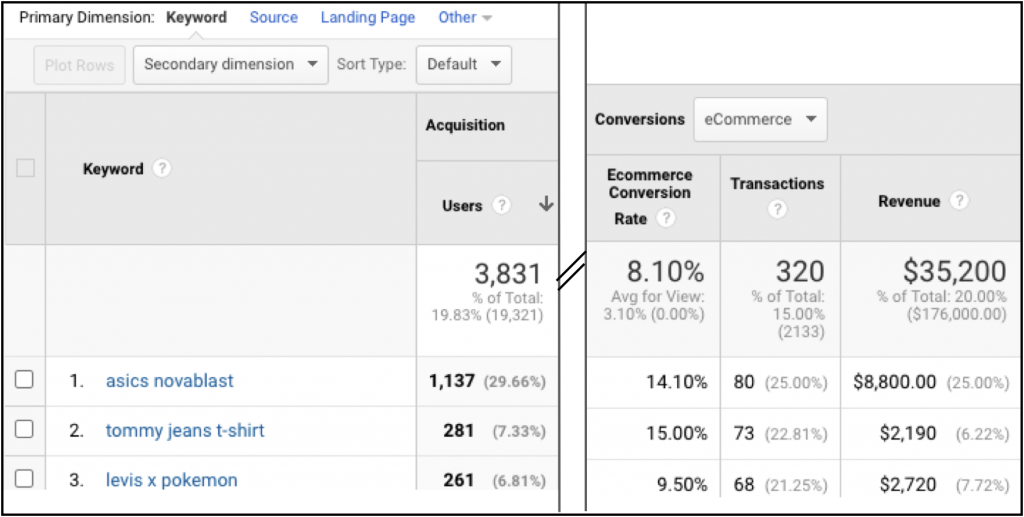Is finding keywords in Google Analytics still something that interests digital marketers?
It would seem that it’s more interesting now than ever before.
Why is that?
It could be explained by keywords in Google Analytics tipping over the 99% mark.

Maybe the 99% is a tipping point—being so close to 100%— that has triggered a renewed interest in finding keywords in Google Analytics.
Interest in the search term ‘not provided’ peaked on Google Trends in October 2020, with the highest ever number of worldwide searches.

Has anything changed with keywords in Google Analytics?
Yes.
With advancements in data processing compared with eight years ago and new scientific know-how, there is a solution.
It involves reverse engineering the keywords back using nine different data sources.
Rand Fishkin tweeted about it.

How does it work?
A team of data scientists from the Fraunhofer Institute of Technology with access to vast amounts of data points from browser extensions used for the past four years were able to solve this as a data science problem.
Processing the information—the algorithm etc—could have worked back in 2011, but the enormous amount of data was the limiting factor.
Just uploading the information back into our customers’ accounts would have taken 13 hours and it was prohibitively expensive, so it wasn’t a runner as a business idea.
We do it in 7 steps
- Step 1: Pull together nine different data sources
- Step 2: Perform Google Analytics data analysis
- Step 3: Analyze organic traffic for keyword fluctuation in Serp
- Step 4: Train the keyword classifications
- Step 5: Match sessions with keywords using an algorithm
- Step 6: Start computation to unlock keywords not provided
- Step 7: Session vs. string-based matching
You can read more about our mathematical approach here.
Is it still important to see these keywords?
I am biased, but I think probably now more than ever.
That is because people are becoming aware of the limitations of Google Search Console as a workaround.
And, without being able to see your keyword in Google Analytics you are missing out on a lot of insight.
Take for example an ecommerce shop.
If they were able to see which keywords people were using to find different pages on their website they could use keyword optimization to maximise the conversions for each of these search terms.

In the example above it appears the search term ‘Asics Novablast’ has a much higher than average conversion rate.
It would make sense to display images of these runners at the top of the landing page to ensure that the search intent of people searching for ‘Asics Novablast’ is met with the right page content.
It seems also that the search term ‘tommy jeans t-shirt’ converts almost twice as well as the average keyword. By identifying which landing page people end up on when they search for ‘tommy jeans t-shirt’, a savvy ecommerce merchant could tailor the page content, along with visual design so that website visitors can find this fashion line with greater ease.
The third search term in the above example is ‘levis x pokemon’. This pokemon themed line of Levis converts better than average and accounts for 7.72% of revenue.
As the third highest traffic acquisition search terms it would make sense to ensure that the related landing page that people end up on when they search for ‘levis x pokemon’, matches user intent and features this line of clothing prominently.
Ecommerce merchants can benefit from seeing keywords in Google Analytics as they allocate their SEO budget based on ROI for SEO keywords.
Perhaps once keywords are once again visible in GA, the SEO team can pinpoint landing pages with high bounce rates, which will highlight that people using a search terms are disappointed with the choice of clothing available on that page. If this is coupled with a low conversion rate, it might be worth investigating the problem.
Google Search Console plugins
There are a few companies that promise to reveal your keywords in Google Analytics by connecting you to Google Search Console.
The problem, as I spoke about before, is if I search for a keyword and click a result, hit return, and click the same result again, does Google consider that two distinct clicks or just one?
First, Google samples the data.
Yet, they may not sample the data when Google considers the two similar queries to represent one search.
This difference is why thousands of your keywords don’t show up on GSC.
Let’s take an example.
I put in a search for ‘Italian restaurant in New York’.
Not satisfied with the result, I immediately search again for ‘Indian restaurant in New York’.
These two queries are related due to the use of the same keywords ‘restaurant’ and ‘New York’ and the time proximity of the searches.
So they grouped into the same session.
This is one of the reasons why we use nine different data sources before training and classifying the keyword data.
It’s a complicated process to reclaim your keywords in Google Analytics, and Google Search Console is just one small piece in the puzzle.
However, as interest in finding a solutions grows, digital marketers will want a solution that provides a more robust resolution for this, still relevant, problem.


